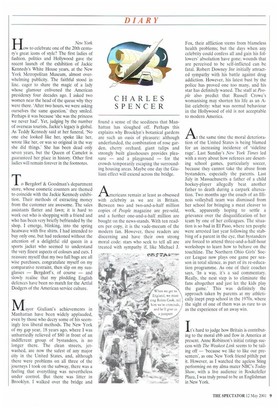CHARLES SPENCER
HNew York
ow to celebrate one of the 20th century's great icons of style? The first ladies of fashion, politics and Hollywood gave the recent launch of the exhibition of Jackie Kennedy's White House years, at the New York Metropolitan Museum, almost overwhelming publicity. The faithful stood in line, eager to share the magic of a lady whose glamour enlivened the American presidency four decades ago. 1 asked two women near the head of the queue why they were there. 'After two hours, we were asking ourselves the same question,' they smiled. Perhaps it was because 'she was the princess we never had'. Yet, judging by the number of overseas tourists, Jackie's legacy is global. As Teddy Kennedy said at her funeral, 'No one else looked like her, spoke like her, wrote like her, or was so original in the way she did things.' She has been dead only seven years, but the Queen of Camelot is guaranteed her place in history. Other first ladies will remain forever in the footnotes.
To Bergdorf & Goodman's department store, whose cosmetic counters are themed to coincide with the Jackie Kennedy exhibition, Their methods of extracting money from the customer are awesome. The sales assistants flatter and fawn; it is hard to work out who is shopping with a friend and who has been very briefly befriended by the shop. I emerge, blinking, into the spring heatwave with five shirts. I had intended to buy only one, but had reckoned without the attention of a delightful old queen in a sports jacket who seemed to understand the very finest aspects of colours and cuts. I reassure myself that my two full bags are all wise purchases, congratulate myself on my comparative restraint, then slip on my sunglasses — Bergdorfs, of course — and slowly realise that my plodding English defences have been no match for the Artful Dodgers of the American service culture.
Mayor Giuliani's achievements in Manhattan have been widely applauded, even by those who decry some of his seemingly less liberal methods. The New York of my gap year, 18 years ago, where I was unhurriedly relieved of $80 in front of an indifferent group of bystanders, is no longer there. The clean streets, jetwashed, are now the safest of any major city in the United States, and, although there were problems on all three of the journeys I took on the subway, there was a feeling that everything was nevertheless under control. But there was litter in Brooklyn. I walked over the bridge and
found a sense of the seediness that Manhattan has sloughed off. Perhaps this explains why Brooklyn's botanical gardens are such an oasis of pleasure: although underfunded, the combination of rose garden, cherry orchard, giant tulips and strongly built glasshouses provides pleasure — and a playground — for the crowds temporarily escaping the surrounding housing areas. Maybe one day the Giuliani effect will extend across the bridge.
Americans remain at least as obsessed with celebrity as we are in Britain. Between two and two-and-a-half million copies of People magazine are pre-sold, and a further one-and-a-half million are bought on the news-stands. With ten readers per copy, it is the vade-mecum of the modern fan. However, these readers are discerning and have their own strong moral code: stars who seek to tell all are treated with sympathy if, like Michael J. Fox, their affliction stems from blameless health problems; but the days when any celebrity could confess all and gain his followers' absolution have gone; wounds that are perceived to be self-inflicted can be fatal. Robert Downey Jnr initially attracted sympathy with his battle against drug addiction. However, his latest bust by the police has proved one too many, and his star has definitely waned. The staff at People also predict that Russell Crowe's womanising may shorten his life as an Alist celebrity: what was normal behaviour inthe Hollywood of old is not acceptable to modern America.
At the same time the moral deterioration of the United States is being blamed for an increasing incidence of 'sideline rage'. Last Sunday's New York Times led with a story about how referees are deserting school games, particularly soccer, because they cannot take the abuse from bystanders, especially the parents. Last July in Massachusetts a father of a child hockey-player allegedly beat another father to death during a carpark altercation. Two months ago the coach of an Illinois volleyball team was dismissed from her school for bringing a meat cleaver to work, apparently hoping to settle a grievance over the disqualification of her team by one of her colleagues. The situation is so bad in El Paso, where ten people were arrested last year following the stabbing of a parent in the eye, that bystanders are forced to attend three-and-a-half-hour workshops to learn how to behave on the touchline. The Northern Ohio Girls' Soccer League now plays one game per season in total silence, as part of its re-education programme. As one of their coaches says, 'In a way, it's a sad commentary. Really, the next step is to eliminate the fans altogether and just let the kids play the game.' This was definitely the approach taken by parents at my athletically inept prep school in the 1970s, where the sight of one of them was as rare to us as the experience of an away win.
It's hard to judge how Britain is contributing to the moral ebb and flow in America at present. Anne Robinson's initial ratings success with The Weakest Link seems to be tailing off — 'because we like to like our presenters', as one New York friend pithily put it. However, as I watched the ageless Sting performing on my alma mater NBC's Today Show, with a live audience in Rockefeller Plaza, I was truly proud to be an Englishman in New York.


































































 Previous page
Previous page